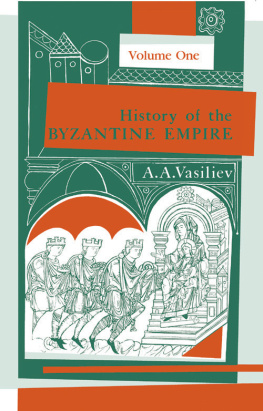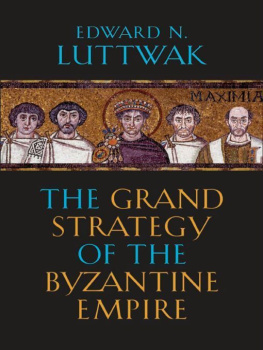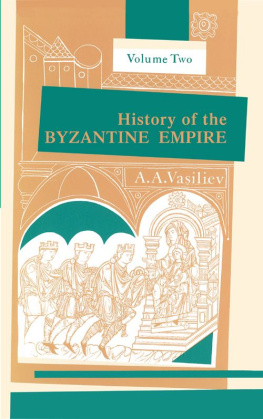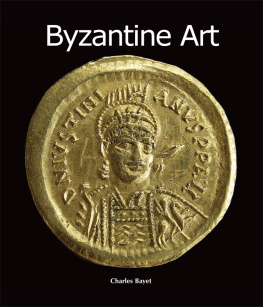A. A. Vasiliev
HISTORY OF THE BYZANTINE EMPIRE
3241453
Volume I
THE UNIVERSITY OF WISCONSIN PRESS
The University of Wisconsin Press
1930 Monroe Street, 3rd Floor
Madison, Wisconsin 53711-2059
uwpress.wisc.edu
3 Henrietta Street
London WC2E 8LU , England
eurospanbookstore.com
Second English edition
Copyright 1952; in Canada, 1952
Copyright renewed 1980
The Board of Regents of the University of Wisconsin System
All rights reserved. No part of this publication may be reproduced, Stored in a retrieval system, or transmitted, in any format or by any means, digital, electronic, mechanical, photocopying, recording, or otherwise, or conveyed via the Internet or a Web site without written permission of the University of Wisconsin Press, except in the case of brief quotations embedded in critical articles and reviews.
The first English edition was published as
University of Wisconsin Studies in the Social Sciences
and History, Numbers and 14, 19281929,
Concerning editions in other languages,
see Preface, p. iii.
Printed in the United States of America
ISBN 978-0-299-00923-6 (e-book)
PREFACE
M Y History of the Byzantine Empire, which now comes out in a new English edition, has a rather long history. Its original text had been published in Russia, in Russian. The first volume was in press during the last months of imperial Russia and in the early days of the first revolution, and appeared in 1917, without footnotes, under the title Lectures in the History of Byzantium (down to the Crusades). The second volume, in three separate parts, Byzantium and the Crusades, The Latin Sway in the Levant, and The Fall of Byzantium, was printed in 19231925, and was supplied with references to the original and secondary sources. The Russian edition is now entirely out of date.
The first English edition came out twenty-three years ago (19281929) in two volumes, in the University of Wisconsin Studies. Basing the text of this edition on the Russian original, I thoroughly revised, supplemented, and brought it up to date. This edition has long been out of print.
In 1932, I revised and enlarged considerably the text for the French edition which appeared in Paris in the same year, and which is now out of print also. Later, I made just a few changes for the Spanish edition, which was published in Barcelona in 1948. The Turkish edition of the first volume of this work, which came out at Ankara in 1943, is the translation from the French edition. Surprisingly enough, this edition is entirely out of print, so that even I myself, the author, have no copy of my own, and saw a copy from the Library of Congress.
This second English edition is based on the French. But since 1932 when the French edition appeared, nineteen years have passed, and during this period many works of great value have been published and are to be incorporated in the new edition. In 1945, in accordance with the wish of the University of Wisconsin, I revised the text again for a new edition, and even added a special section on Byzantine feudalism. However, this revision was made in 1945, and during the period from 1945 to 1951 other more important publications have appeared. I have tried to do my best to make a list of necessary additions and changes; but this has been made sporadically, not sys tematically, and I am afraid that several essential lacunae may be discovered in the most recent period.
During the last two years, my former student and now the distinguished professor at Rutgers University, Peter Charanis, was of great help to me, particularly in the preparation of bibliography, and it is my duty and pleasure to express to him my deep gratitude. As I said in the preface to the first English edition, however, it is not my intention to give a complete bibliography of the subject, so that in the text as well as in the bibliography, I give only the most important or most recent publications.
Though fully aware that the chronological scheme of my work sometimes presents serious inconveniences, I have not changed it in this new edition; to do so I should have had to write an entirely new book.
I express my cordial thanks to Mr. Robert L. Reynolds, Professor of History at the University of Wisconsin, and the University of Wisconsin Geography Department who have been very kind and cooperative in assisting the editors of this book with the preparation of maps. I also tender my warmest thanks to Mrs. Ednah Shepard Thomas who, with remarkable conscientiousness, has revised my manuscript and corrected the inadequacies of my English. Finally, I should like to thank Mr. Kimon T. Giocarinis for the difficult task of compiling an index for this book.
A. A. Vasiliev
Dumbarton Oaks,
Harvard University
Washington, D.C.
POSTSCRIPT
Now, six years after Professor Vasiliev wrote the foregoing, tracing the lengthy and varied publication history of his book, we are pleased to undertake this new printing. In two volumes and a paper cover, the text and all reference matter remain unchanged from the 1952 edition, except for the correction of a few typographical errors.
The Publisher
February, 1958
TABLE OF CONTENTS
LIST OF MAPS
HISTORY OF THE
BYZANTINE EMPIRE
3141453
CHAPTER I: THE STUDY OF BYZANTINE HISTORY
WESTERN EUROPEAN SCHOLARSHIP
T HE period of the Italian Renaissance was primarily concerned with the classical literature of Greece and Rome. Byzantine literature was almost unknown in Italy, and there seemed to be no marked desire to become acquainted with it. This neglectful attitude toward medieval Greek literature gradually changed as a result of frequent visits to the East in search of Greek manuscripts and the thorough study of the Greek language, but during the fourteenth and fifteenth centuries interest in Byzantine literature was only casual and was completely overshadowed by interest in the classical world.
During the sixteenth century, however, interest in Byzantine history and literature became more pronounced. In this century numerous works of Byzantine writers, though unequal in importance and chosen at random, were published in various parts of Europe: in Germany by Hieronymus Wolf, in Holland by Meursius, in Italy by two GreeksAlemannus and Allatius.
The part played by France
The truly scientific study of the Byzantine period was begun in France during the seventeenth century. It was during the brilliant period of Louis XIV that Byzantine scholarship found a place of honor in Francethe era when French literature became a model for all Europe, when kings, ministers, bishops, and private individuals vied with each other in founding libraries and collecting manuscripts, when every kind of favor and attention was showered upon learned men.
In the early part of the seventeenth century Louis XIII translated from the original Greek into French the instructions of Deacon Agapetus to Justinian. Cardinal Mazarin, a lover of books and a tireless collector of manuscripts, founded a rich library which included numerous Greek writings. After his death this collection passed into the possession of the Paris Royal Library (now the National Library), which had been founded in the sixteenth century by Francis I. The famous minister of Louis XIV, Colbert, who was also director of the royal library, strove constantly to add to its literary treasures and to obtain manuscripts from abroad. In the eighteenth century the king acquired for the royal library the rich private collection of Colbert, which contained a large number of Greek manuscripts. Cardinal Richelieu founded the royal press in Paris (the Louvre Press) for the purpose of publishing in a satisfactory style the works of outstanding writers. The type face used by this press, known as Royal Greek, was remarkable for its beauty. In 1648, under the patronage of Louis XIV and Colbert, the royal printing house published one volume of the first collection of the works of Byzantine historians. By the year 1711 thirty-four folio volumes of this collection had been published. The edition was a great achievement for its time, and has not been supplanted entirely to this day. At the time the first volume of this collection appeared the French editor and scholar Labb (Labbaeus) issued an appeal (Protrepticon) to all lovers of Byzantine history in which he stressed the importance of the history of the Eastern Greek Empire, so astonishing in the number of events, so alluring in its diversity, so remarkable in the length of its duration. He urged European scholars to search out and publish documents buried in the dust of libraries, promising to all collaborators eternal fame more enduring than marble and brass.










